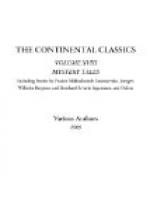“It may be so, father; we may lose our country as regards ourselves, but we give one instead of ten millions, who were hitherto our own people, and yet strangers in their native land.”
“Chimera! The people will not understand you. They never even dreamt of what you wish to give them. The true way to seek the people’s welfare is to give them what they need.
“Ask my dependents! Is there one among them whom I have allowed to suffer want or ruin, whom I have not assisted in times of need?—or have I ever treated them unjustly? You will not hear a murmur. Tell them that I am unjust notwithstanding, because I do not call the peasant from his plow to give his opinions on forming the laws, and constitution,—and what will be the consequence? They will stare at you in astonishment; and yet, in their mistaken wrath, they will come down some night and burn this house over my head.”
“That is the unnatural state of the times. It is all the fault of the past bad management, if the people have no better idea. But let the peasant once be free, let him be a man, and he will understand all that is now strange to him.”
“But that freedom will cost the lives of thousands!”
“I do not deny it. Indeed, I believe that neither I nor any of the present generation will reap the fruits of this movement. I think it probable that in a few years not one of those whose names we now hear spoken of may still be living; and what is more, disgrace and curses may be heaped upon their dust. But a time will come when the great institutions of which they have laid the foundation will arise and render justice to the memory of those who sacrificed themselves for the happiness of future generations. To die for our country is a glorious death, but to carry with us the curses of thousands, to die despised and hated for the salvation of future millions, oh! that is sublime—it is Messiah-like!”
“My son—my only son!” cried his father, throwing himself passionately on the young man’s neck and sobbing bitterly. “Do you see these tears?”
“For the first time in my life I see them, father—I see you weep; my heart can scarcely bear the weight of these tears—and yet I go! You have reason to weep, for I bring neither joy nor glory on your head—and yet I go! A feeling stronger than the desire of glory, stronger than the love of my country, inspires my soul; and it is a proof of the strength of my faith that I see your tears, my father—and yet I go!”
“Go!” murmured his father, in a voice of despair. “You may never return again, or, when you do, you may find neither your father’s house nor the grave in which he is laid! But know, even then, in the hour of your death, or in the hour of mine, I do not curse you—and now, leave me.” With these words he turned away and motioned to his son to depart.
Imre silently left the apartment, and as soon as he had closed the door the tears streamed from his eyes; but before his sword had struck the last step his countenance had regained its former determination, and the fire of enthusiasm had kindled in his eye.




